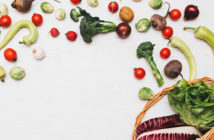Once you have made a commitment to living healthy and eating whole foods and nutritious foods, it is important to understand food safety, and what foods are good for you and the environment. Organic food has become a popular term nowadays, most believe organic food is very healthy and should be preferred over processed or genetically modified food. Do you know the difference between organic food and conventionally grown food? Do you believe in the labels at your grocery stores, indicating some fruits and veggies as organic? Are they really organic and healthy?
What are organic foods?
Organic foods grow differently than your local fruits and veggies at a grocery store, specific requirements are met in the agriculture to grow crops in an organic way. Most importantly, organic foods such as fruits, vegetables, grow separately from conventional crops; these do not have bioengineered genes, synthetic pesticides, and certain fertilizers with harmful chemicals. Thus, organic food grows in safe soil, and most importantly, has no GMOs, no preservatives, organic livestock also gets organic feed, and they must not ingest growth hormones or antibiotics.
Technically, any food that grows in natural conditions, whether in your home, or locally grown in farmer’s market or other places, is organic, it is free of pesticides, certain fertilizers, and GMOs. When the livestock feeds on grass and not modified soy and other products, it becomes organic livestock. Eating organic food is beneficial for you and your family; many people are allergic to foods with chemicals and preservatives. Organic foods have more antioxidants and are rich in nutrients than your conventionally grown food.
Organic foods have fewer pesticides; pesticides are not good for the environment, birds and animals living on or near the farm. GMO is a big term these days and organic foods are not genetically engineered, meaning the DNA is not altered to produce varieties that cannot occur in nature. Interestingly, GMOs are restricted or banned altogether in most countries, including, Italy, France, Germany, UK, Greece, Spain, Australia, New Zealand, Saudi Arabia, and Philippines. While the FDA insists the use of GMOs is safe, many food safety authorities are concerned about the long-term safety of genetically modified plants and animals.
What are the risks of eating inorganic foods?
The pesticides used in inorganic foods can cause or trigger certain types of cancers in humans, the most vulnerable are children, new born, and pregnant women with growing fetuses. The widespread of breast cancer, brain tumor, and prostate cancer is often linked to use of inorganic food over many years. These pesticides can weaken the immune system, cause birth defects in fetuses, and headaches and migraines for many. However, rinsing the fruits and vegetables can reduce, but not properly eliminate the pesticides from the food. GMOs may cause gastro-intestinal problems, and allergic reactions, especially in children.
Organic farmers use natural fertilizers and apply natural methods to thwart insects and herbs from the plants, livestock receives no antibiotics, or hormone injections, livestock grazes outdoors, and disease is prevented with natural methods.
Where to buy organic foods, and what to avoid?
USDA labels real organic food as “100% organic”, food labeled only as “organic” means 95% of the food has organic ingredients. Look for non-GMO or GMO-free verified seal on the food labels, or look for labels “natural and all natural”. You can keep the cost of buying organic foods within limit if you shop from a local farmer’s market and buy seasonal produce. Now, are you thinking of what you need to buy organic and what you need to avoid?
Buy organic apples whenever possible, as apples have the highest level of pesticides sprayed on them in conventional farms. Your juicy strawberries have more than 40 different pesticides sprayed on them; celery has more than 60 pesticides sprayed on them. Other fruits and vegetables with high pesticides are grapes, peaches, spinach, sweet bell peppers, apricots, cucumbers, potatoes, kale, collard greens, Zucchini, lettuce, blueberries, and red fatty meats. Try finding organic varieties of these foods.




